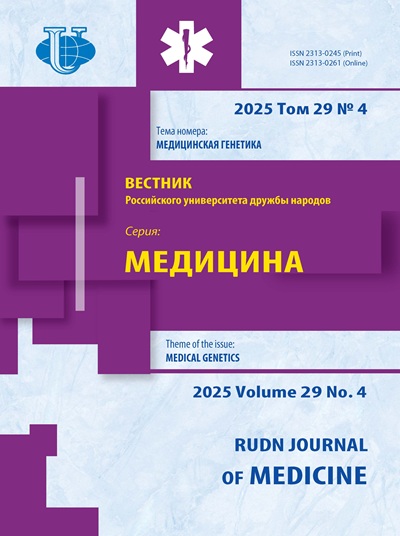The state of the microflora of prostate secretions in healthy individuals and in acute bacterial prostatitis
- Authors: Masljakov V.V.1, Pavlova O.N.2, Cymbal A.A.3, Pronina E.A.4, Sultonov F.P.1
-
Affiliations:
- Mari State University
- Samara State University of Railways
- Sechenov University
- Saratov Medical University «Reaviz»
- Issue: Vol 25, No 4 (2021): CARDIOLOGY
- Pages: 339-345
- Section: MICROBIOLOGY
- URL: https://journals.rudn.ru/medicine/article/view/29720
- DOI: https://doi.org/10.22363/2313-0245-2021-25-4-339-345
- ID: 29720
Cite item
Full Text
Abstract
Relevance. Acute bacterial prostatitis is one of the urgent problems in urology. According to the data presented in the literature, the number of men who have been diagnosed with this disease ranges from 10 to 40 %. At the same time, the main etiological factor in the development of this pathology is most often assigned to the bacterial microflora. However, most of the works are devoted to the study of the microflora in chronic prostatitis, and the state of the microflora in acute bacterial prostatitis remains insufficient. The aim of the study is to evaluate the state of prostate secretion microflora in a comparative aspect in healthy individuals and in patients with acute bacterial prostatitis. Materials and Methods. The study included a comparative analysis of microbiological cultures in prostate secretion of 30 people. All examined were divided into two groups: the first included 15 people without established urological pathology, the second - 15 people with an established diagnosis of acute bacterial prostatitis. Results and Discussion. As a result of the study, it was found that when sowing prostate secretion in persons without established pathology, the absence of microorganism growth was not observed in 60 % of observations, while in 40 % of cases, microorganism’s growth was obtained. In the group of examined without established urological pathology, the growth of microorganisms of the following was noted: Escherichia coli - in 58 % of observations; Staphylococcus epidermidis - in 10 % of observations; Staphylococcus warnerii - in 6 % cases and Enterobacter spp. - in 26 %. At the same time, the number of detected microorganisms did not exceed 104 CFU/ml. At the same time, the presence of microbial associations was not recorded. In patients with acute bacterial prostatitis, the sterile prostate secret was 13,3 %, and in 86,7 % of people, microflora growth was obtained. Most often, in the group examined with acute bacterial prostatitis, Escherichia coli was obtained - in 45 % of the observations; Klebsiella spp. - in 23 % cases and Proteus spp. - in 19 %. Less often Staphylococcus epidermidis - in 8 % of observations; Enterobacter spp. - 3,2 %. Serratia spp. - 1,1 % and Staphylococcus warnerii - in 0,7 % cases were the least obtained. At the same time, 86 % of observations in this group revealed microbial associations. Conclusion . Comparison of the state of microflora of prostate secretions in healthy individuals and patients with acute bacterial prostatitis revealed that in patients with acute bacterial prostatitis, the absence of inoculated microflora in prostate secretions was 3 times less than in healthy individuals (13.3 % and 40 %, respectively.), and Escherichia coli was the most common microorganism in the group of patients with acute bacterial prostatitis.
About the authors
Vladimir V. Masljakov
Mari State University
Author for correspondence.
Email: maslyakov@inbox.ru
ORCID iD: 0000-0002-1788-0230
Yoshkar-Ola, Russian Federation
Olga N. Pavlova
Samara State University of Railways
Email: maslyakov@inbox.ru
ORCID iD: 0000-0002-8055-1958
Samara, Russian Federation
Alexandr A. Cymbal
Sechenov University
Email: maslyakov@inbox.ru
ORCID iD: 0000-0002-1288-5796
Moscow, Russian Federation
Elena A. Pronina
Saratov Medical University «Reaviz»
Email: maslyakov@inbox.ru
ORCID iD: 0000-0002-8242-6798
Saratov, Russian Federation
Firdavshudzha P. Sultonov
Mari State University
Email: maslyakov@inbox.ru
ORCID iD: 0000-0001-9459-7933
Yoshkar-Ola, Russian Federation
References
- Walz J, Perrotte P, Hutterer G. Impact of chronic prostatitis like symptoms on the quality of life in a large group of men. BJU Int. 2007;100:1307—1311.
- Naber KG, Valensik V, Vagenlener FME. Acute and chronic prostatitis — what is important for practice? Urology bulletin. 2016;2:71—83. (In Russian)
- Shheplev PA. Prostatitis; MEDPressin-form, 2007. (In Russian)
- Tunik TV, Ivanova EI, Grigorova EV. Spectrum of representatives of opportunistic microflora isolated from prostate secretion in chronic bacterial prostatitis. Acta Biomedica Scientifica. 2017;2(5—2):70—73. (In Russian)
- Naber KG, Suhorukova MV. Microbiological aspects of diagnosis of chronic prostatitis. Clinical microbiology and antimicrobial chemotherapy. 2006;8(1):4—17. (In Russian)
- Kaljuk AN. Methods of bacteriological investigation of opportunistic microorganisms in clinical microbiology. Methodological recommendations of the Ministry of Health of the RSFSR of December 19, 1991. (In Russian)
- Shangichev AV, Naboka JuL, Ibishev XS, Kogan MI. Microbial spectrum and antibiotic sensitivity of prostate secretion microorganisms in chronic bacterial prostatitis. Kuban Scientific Medical Bulletin. 2010;3—4:207—211. (In Russian)
- Shormanov IS, Solovev AS. Effect of complex etiopathogenetic therapy on prostatic hemodynamics in patients with chronic bacterial prostatitis. Bulletin of the Ivanovo Medical Academy. 2016;3(21):32—36. (In Russian)
Supplementary files















